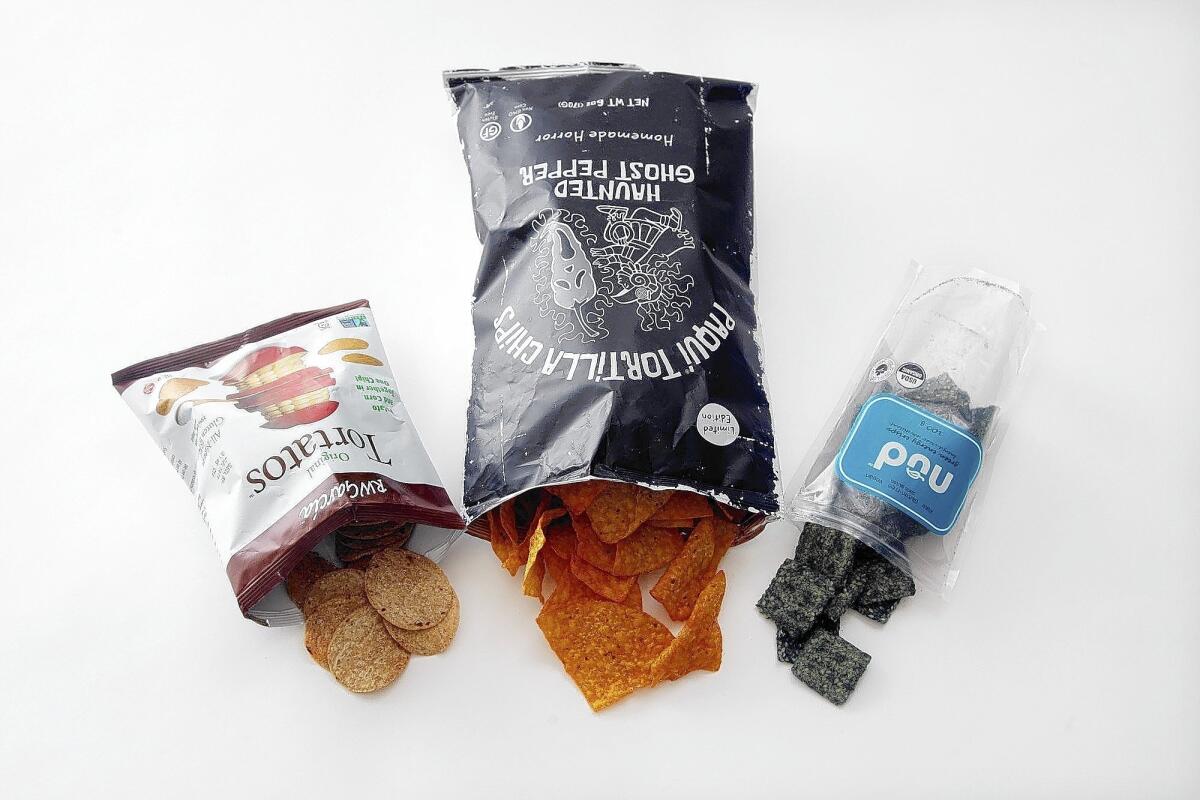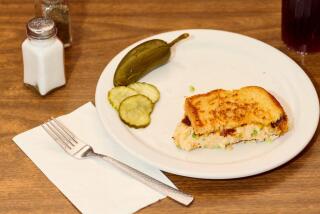Natural Products Expo West harvests snacks, discusses labeling

When you shop for food, are you thinking of your devotion to the environment or to animal welfare? Do your primary concerns involve allergies or genetically modified (GMO) ingredients? Even as the federal government is working to simplify food labels, manufacturers and marketers are increasingly adding icons to appeal to shoppers’ priorities.
Those efforts were front and center at the mammoth Natural Products Expo West, held last week at the Anaheim Convention Center, where tens of thousands of convention-goers examined thousands of products, ranging from those invented in home kitchens to items produced by major companies. It was a marketplace of overwhelming choices, with snack products — chipped, popped and puffed, frozen and dried, sweet or spicy — in booth after booth.
Amid the package claims about gluten, humane treatment of animals, kosher and fair-trade practices, and rain-forest-friendliness, we also spied plenty of products that were fun, delicious and just plain cool — such as the haunted ghost pepper flavor of Paqui Tortilla Chips, a product that comes with a warning: “Side effects include addiction to burning pain.”
PHOTOS: A few bites from the Natural Products Expo
We saw sriracha-flavored hummus from Hope Foods; chlorophyll-enhanced rice ramen from Lotus Foods; savory yogurt flavors including beet, butternut squash and tomato from the renowned Blue Hill Farm in New York; and Tattoo Butter, an herbal salve created to heal the skin and enhance the colors in body art. Coconut and ancient grains like kamut and amaranth found their way into lots of foods and personal care items.
Not surprisingly, kale — supported by chia seeds, popcorn and bars of all kinds — was one star of the show, with products such as Supereats kale chips, which actually look and taste of kale. Co-founder Charlie Ruehr said he and his partner were eating healthful meals but “still snacking on garbage” and wanted to change that.
We were intrigued by the camel’s milk from Desert Farms, from camels mostly being raised on Amish farms in the Midwest. It’s a new company born as a USC class project by Walid Abdul-Wahab. The milk is sweet and earthy and naturally half the fat of whole cow’s milk. So far it is available in just two stores in Texas and Ohio, he said.
And despite all the nutritional bashing soda has taken, a fair number of brave entrepreneurs are bringing high-end sodas to the market. GUS (for grown-up soda) even has its Meyer lemon flavor in two of the country’s top restaurants, Thomas Keller’s Per Se in New York and French Laundry in the Napa Valley, according to Steve Hersh, who owns the New York company with his wife.
Sometimes the product isn’t as new as the perspective. Matt D’Amour and his partner sell peanut butter, with some variations. Their Yumbutter comes in pouches — for backpackers, parents with kids in the car and gym rats. And, like many young entrepreneurs at the show, they donate some of their proceeds to causes — in their case, feeding hungry children.
Businesses that give back were common at the show, contributing to the icons on packages with logos from two certifying groups — 1% for the Planet and B Corp. — meant to indicate that the company uses its business “as a force for good.” More than 60 companies at the show carried the B Corp. logo. The Sparks, Nev., company TruVibe takes part in 1% for the Planet but also hopes the naming of its products, including Cacao Powder Courage and Goji Berry Gratitude, will inspire customers “with positive energetic vibes toward what you eat,” according to a company statement.
Brad Gruno sells Brad’s Raw Chips, a line of snacks that promise to be gluten-free, non-GMO, kosher, vegan and organic. Chandler Farm, from Colorado, has labels that explain its skin care products are “palm oil free” to help the endangered orangutan survive in Indonesia. There are logos that tell consumers that a company supports People for the Ethical Treatment of Animals or the Rainforest Alliance.
It’s a lot for a consumer to take in.
The icon that attracted the most attention at the expo came from the Non-GMO Project, which promises its products are free of ingredients made with the use of laboratory-based gene-altering methods. By the end of 2013, 1,600 brands carried the Non-GMO label, according to the nonprofit organization.
Interest has been driven in part by Whole Foods — the pot at the end of the rainbow for many companies at this show. The supermarket chain has announced that by 2018 all of its products would be labeled for genetically modified organisms.
Hundreds of people turned out for a lively panel on GMO labeling to hear David Bronner, president of Escondido-based Dr. Bronner’s Magic Soaps, and Gary Hirshberg, one of the founders of Stonyfield Farm yogurt. Most of the discussion centered on ballot measure battles to mandate labeling (which have failed in California and Washington but are coming up in Oregon and other places), rather than on the science of genetic engineering.
“Consumers are really hungry for information about the food they eat and feed their families,” said Courtney Pineau, assistant director of the Non-GMO Project. Labeling, Bronner said, serves “the fundamental American right to know” what’s in products.
ALSO:
World Sleep Day is meant to be a wake-up call
L.A. Walks: A lakeside hike at Whittier Narrows Recreation Area
Get up! Study says sedentary time means less ability in everyday life
More to Read
Eat your way across L.A.
Get our weekly Tasting Notes newsletter for reviews, news and more.
You may occasionally receive promotional content from the Los Angeles Times.







